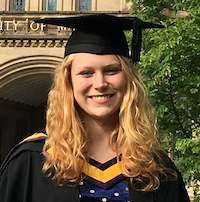



Rachael Keslake
Aura CDT Activities:
I am currently a Cohort 1 Student Rep on the Aura CDT Student Committee.
I have represented the Aura CDT at a RenewableUK parliamentary reception, as part of the University of Hull delegation.
Background:
My background includes an MEng in Chemical Engineering from the University of Manchester. During my time at university I completed a year in industry working as a Manufacturing Intern in the Aerospace Supply Chain in Rolls Royce in Derby. During this year I undertook a dissertation analysing the etching process of critical aerospace components
Research Interests:
I’m interested in research that is experimental and science focused. The areas I am interested in include research into new and better chemical coatings of wind turbines as well as the materials used in the creation of the blades. All of this whilst still considering and mitigating all environmental impacts and if possible, making the turbine more environmentally friendly.
Why I applied for the Aura CDT:
I applied to the Aura CDT as I know I want my career to be two things, first of all working towards a more sustainable future and secondly to be at the forefront of research and innovation. The CDT perfectly combines these two. Having the first year of a PGDip was an extra benefit as it gives me time to prepare for my PhD and thoroughly consider the topics I might undertake as well as provides the opportunity to learn about multiple aspects of offshore wind energy from marine biology to deep machine learning.
PhD Research:
My PhD project is concerning the feasibility of the integration of synthetic fuel as an energy vector for offshore wind.
More information on this PhD Research Project.
Contact: r.keslake-2019@hull.ac.uk
Twitter: @RKeslake
LinkedIn: Rachael Keslake

For an informal discussion, call +44 (0) 1482 463331
or contact auracdt@hull.ac.uk